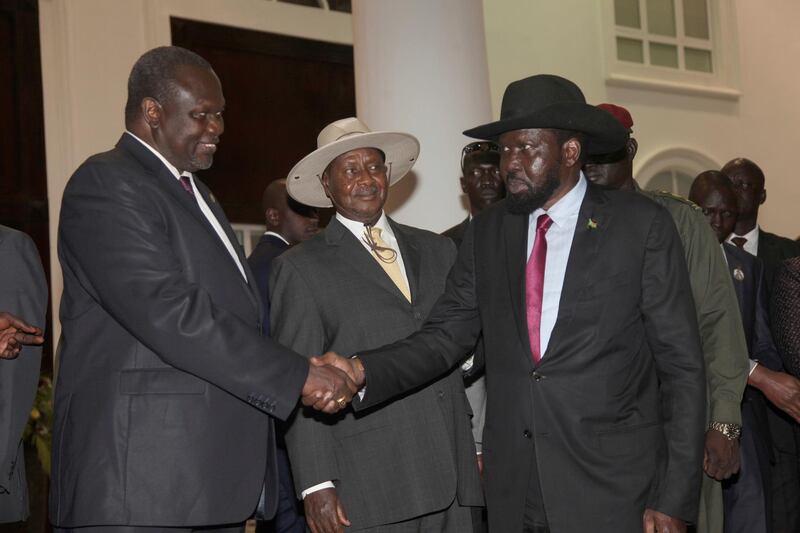In 2014, Suzanne Achowel, a 50-year-old South Sudanese Christian, was shot in the leg during clashes between government and rebel forces at the start of the young country’s civil war.
Already displaced by earlier fighting, Ms Achowel had taken shelter alongside 50,000 others at the UN mission in Malakal, South Sudan's second largest town. At least 30 were killed in the crossfire.
For a month, Ms Achowel was unable to see a doctor. Later the UN evacuated the most vulnerable civilians to the capital Juba some 520 kilometres to the south, but she was not among them.
Instead, Ms Achowel travelled northwards with her family to Khartoum for medical treatment, an arduous 780 kilometre overland journey towards what she hoped would be a better life in the Sudanese capital.
The incident illustrates the near total disregard for civilian life by both rebels and government alike in South Sudan’s four-and-a-half-year civil war. It also highlights a more surprising trend: despite a persecution of religious minorities that prompted South Sudan’s secession, today Sudan’s Christian population is growing.
South Sudanese cited a denial of religious freedom as a major driver towards independence. Rebels fought two civil wars against Khartoum and in a 2011 referendum, 98.9 per cent of South Sudanese voted for separation.
They hoped that South Sudan would be a haven for Christians. But despite their optimism, from its birth at midnight on July 9, 2011, the world’s youngest country faced myriad challenges.
At independence, South Sudan was fighting at least seven armed groups in nine of the country’s 10 states. By December 2013 the country was in civil war, with the cowboy-hatted President Salva Kiir accusing his then deputy Riek Machar of planning a coup.
To date nine ceasefire agreements have failed to stop the fighting for any longer than a month. On the seventh anniversary of South Sudan’s secession, few have much faith that the latest deal will secure lasting peace.
__________
Read more:
South Sudan cease-fire violated within hours
South Sudan foes sign peace deal
An African solution could ensure vital peace in South Sudan
__________
Of a 2011 population of 12 million, 2 million South Sudanese are today displaced from their homes inside the country and 2.5 million are refugees.
Sudan hosts some 772,000 of them, the majority of whom are Christian. While many complain of persecution and poverty, they say this is preferable to the violence and insecurity of South Sudan’s lingering civil conflict.
The Sudanese economy is still struggling from a 75 per cent drop in oil revenues following South Sudan’s secession. Like the rest of the population, South Sudanese refugees find life tough.
"I only got paid about 1,000 Sudanese Pounds [Dh204],” says Ms Achowel, who now works as a cleaner at a primary school. “I pay 750 for rent and there’s barely anything left after that.”
Her older daughter helps with living expenses by selling food at the same school.
Other South Sudanese refugees have turned to illicit home-brewing to make a living. "So many of them end up in jail for about six months because they cannot pay the fine," said Ahmed Sibair, a human rights lawyer in Khartoum.
Then there are other more serious instances of religious persecution in a country whose legal system is increasingly based on Sharia law.
In its annual International Religious Freedom Report released last month, the United States said Sudanese authorities were "arresting, intimidating, and detaining Christian clergy and church members on religious grounds".
Since South Sudan’s secession, the government in Khartoum has undertaken a campaign of church demolitions, often on the grounds that the buildings are unlicensed. Last year, church leaders argued in court against the demolition of 27 churches in Khartoum alone.
"We usually don't get the permission from the government for building new churches,” said one church leader, who asked to remain anonymous out of concern for his safety.
“We pray in our homes, or have to travel long distances to visit downtown Khartoum,” he said. “It’s a very hostile environment for the Christians.”
South Sudanese Christians have also been prevented from learning their tribal languages. "We were forced to cancel the Nuer language classes,” said the church leader. “So that when security agents come to the church they would understand what we were teaching.”
The overall number of Christians in Sudan is deliberately underreported by government authorities, some experts say. Christians may now make up to seven per cent of Sudan’s population, estimates Mohamed Al Noor, a lawyer who specialised in religious rights in Sudan before fleeing to the UK two months ago after receiving threats from the National Intelligence Security Services about his work. “The government deliberately does not disclose the actual figures,” he said, noting that many Sudanese Christians are forced to worship privately in their homes.
While Khartoum's policy towards its Christians is hardly enlightened, recently President Omar Al Bashir has taken an interest in securing an end to South Sudan's civil war. His interest may be in reviving South Sudanese oil production as way of boosting his own economy, or alternatively as part of his appeal to the US to remove Sudan from its "state sponsors of terrorism" list.
In Khartoum on Saturday, South Sudan’s warring leaders agreed to a power sharing agreement that would see Mr Machar return as vice president. But with details remaining to be hammered out, negotiations move to Nairobi on July 9.





